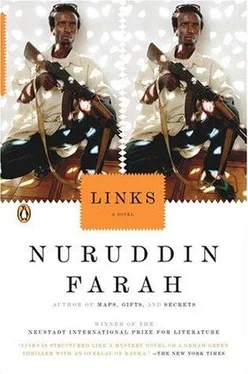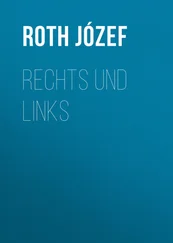Neither spoke for a good while.
“What bothered me most was that I couldn’t tell the bad guys from the good guys,” Bile went on. “After all — not that I had any trust in them — those in uniform, whether they were on the payrolls of the National Army or the police, were all busy looting too. I felt that before long the army and the police would fragment into splinter groups along clan lines. So I moved about in a state of utter confusion.
“I was hungry, frightened, and I didn’t know where I was headed. I didn’t want to go to Caloosha. I couldn’t care less if he was dead or alive. But I wanted to get in touch with Shanta. I had no idea where she was, if she was in danger, or if she had fled the city. It was a nightmare from which, given the choice, I might not have wanted to awaken.
“On one occasion, while moving around, I remember coming up to a madman who took one look at me and kept out of my way — maybe he thought that I was madder than he. Of course, I wasn’t mad in my own mind, because I was overwhelmed with embarrassment at the figure I must have cut — something the mad seldom feel. You see, I wasn’t in a prisoner’s uniform. I was in rags, so dirty not even a beggar would put them on. Part of me wanted to be touched, seen and helped, the other part wanted to hide my eyes, ostrichlike, in the sand of my imagining. In short, I felt suicidal.”
“So what did you do?”
“If twenty years in jail had taught me anything,” he said, “it was never to trust in luck. In any case, I ran into trouble, right where Lazaretto Road meets Stadium Road, when I was accosted by a group of men, common criminals by the look and sound of them. They chased me. I ran faster than they, and had just turned a corner when I saw a group of thugs roaming the area farther on. Luckily I was at a quiet cul de sac, where a gate opened. A boy in his early teens, dressed in sneakers, khaki shorts, and a safari hat, as if ready for a picnic, came out and looked this way and that. He retreated into the house in terrific haste. I waited. Then a big four-wheel-drive with maybe a dozen passengers of all ages, from grandparents to grandchildren, came out, the boy holding the gate open. When the vehicle had reversed out, he pulled the gate shut and got in, and the vehicle sped away. I forced the gate open — it needed only a decisive push — and went in, closing it behind me securely.
“No sooner had I taken my second step than I saw a very fierce dog waiting for me. It was medium-sized, with a short black coat, most likely a Doberman. It was growling and barking. I acted as though I was a friend. But when I moved, the dog bared its teeth and continued barking at me more fiercely than before. I snapped my fingers, tried what I could to make the dog into a friend, but it still barked whenever I moved. It didn’t attack me, though, and eventually I got to a door, and into the kitchen. I bolted myself inside.”
“Then what did you do?”
“I marked time.”
“Doing what?”
“I made myself coffee,” Bile said. “I walked around in the house, marked out my territory, after I had made sure no one else was there. I ventured up to where the bedrooms were, and disconnected the alarm. Being able to achieve this most difficult of feats helped me conquer my fear. I showered, found a wardrobe. The choices were so many. I felt like a child dressing for a birthday party. In the end, I chose a pair of jeans and a pressed shirt. By this time, I had ceased to think of myself as an intruder, and felt like the owner of the house — at least I moved about like I was. It was the kind of house I might have owned or lived in, given the chance.”
“And then?”
“I thought of winning the dog’s trust. I opened the front door and it came at me, growling. But it wasn’t as fierce as before, maybe because I had on its master’s clothes. The dog and I stood there uneasily, sizing each other up. Then I played with it, making it go fetch a ball. An hour and a half of this, and the dog and I became friends of a kind. And it began to follow me everywhere I went, and jumped into the Volkswagen Beetle in the carport when I inspected it, trying to see if it would start.
“I went into the house once I was exhausted from playing with the dog. And when the silence got to me, I switched on the radio to listen to the BBC news and, as I did so, ate some Parmesan cheese of stupendous pedigree. I had coffee and more coffee, and then more Parmesan. Heaven was coffee with Parmesan. I tasted the joy of life in the coffee I drank, and in the Parmesan I ate.”
Bile had a ball of a time, living it up. He hadn’t a care in the world, like someone living on borrowed time, and enjoying every instant of it. He ate cheese or what fruit there was, because he couldn’t bring himself to cook a meal. And because there was not a single book in the entire house, except for school texts in Italian and Somali, he listened to the radio and exercised his leg, which was still giving him a bit of trouble. With plenty of time on his hands, he decided to use it profitably: he taught himself to read and write Somali, which was given an official orthography only in 1972, while he was in prison. And when he tired of learning to read and write, or of listening to the radio or playing with the dog, he went to the telephone and pressed the redial button in hope of speaking to a human voice. The line was either busy or the phone was not functioning, he couldn’t tell.
He wished then that he were one in a crowd, where he could touch and be touched. “That was what I wanted,” he said. “I had lived in total isolation for years, and hadn’t touched or been touched. I envied the mad, naively thinking that they never feel lonely, as their heads are full of talk and of other people’s memories. I envied the madman who could think of himself as a crowd, and behave any way he liked!”
“And then?”
“I felt depressed, miserable, and lonely. I slept for who knows how long, and woke up a new man. My memory, which I thought had gone dead on me, had been stirred into action, selectively remembering some of the things I had seen and done. I couldn’t remember what I had done between when I saw the fierce dog and made myself several cups of espresso and walked about the house alone, marking out the territory as though it was mine, and when I decided to think of myself as a free man. Then I realized I didn’t have to hide in one of the city’s shadowy corners, or reinvent myself by changing the history of my loyalties. It was then that I finally decided to celebrate my freedom!”
“How did you do that?”
“I was going to go out.”
If Jeebleh didn’t ask pointed questions to get Bile to devote a few minutes to answering Af-Laawe’s and Caloosha’s allegations about murdering and stealing, it was because he didn’t wish to interrupt the flow of the narrative. He was sure they would have the opportunity to talk about this and many other subjects too. “And?”
“It was when I was looking for some clothes to carry away for my immediate use that I stumbled on a duffel bag full of money, in large denominations, in cash and ready to go! The amount was staggeringly high, close to a million U.S. dollars. It was there all along, only I hadn’t seen it.”
Jeebleh stared at the scar on Bile’s forehead. An inch long, and pale, no bigger than a caterpillar that would mutate into a butterfly. He stared at it, because he sensed it moving. Now he said, “What did you do?”
“I went to sleep,” Bile said.
“But what on earth for?”
“Not being a thief, and not wanting to tempt fate,” Bile explained, “I decided I no longer had any reason to hurry. I was determined to take my time and decide what to do with the money, whether to appropriate it, or just leave it where I found it.
Читать дальше












